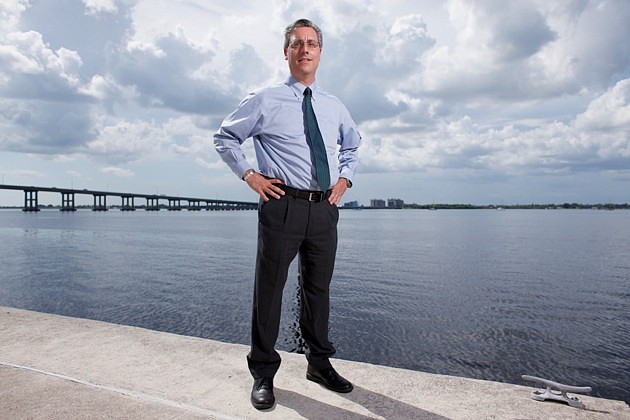- November 24, 2024
-
-
Loading

Loading

When Dan DeLisi moved to Florida, his academic adviser at the Massachusetts Institute of Technology jokingly instructed him to save the Everglades.
Years later, DeLisi, a principal in the engineering firm DeLisi Fitzgerald in Fort Myers, will now have a hand in that effort. In May, Gov. Rick Scott appointed him to the governing board of the South Florida Water Management District.
DeLisi, at age 38 the youngest member of the board, is jumping into one of the most contentious regional disputes. To wit: What to do about the discharges of water from Lake Okeechobee down the Caloosahatchee River to Fort Myers. “The complexity of this dispute is enormous,” DeLisi says.
DeLisi says he's enthused to tackle a problem most observers would find nightmarish. “What an opportunity,” he exclaims.
Making his job on the governing board even tougher: DeLisi is the only representative from the west coast of the state. The rest of the board is made up of residents of the east coast. “By and large they feel sorry for me,” he chuckles.
But despite his lone voice, DeLisi is determined to make a difference. As a young engineer, DeLisi was schooled in the politics of regional development on the staff of the Bonita Bay Group, a residential developer that pioneered consensus building with environmentalists and government bureaucrats.
“I have started facilitating meetings between various factions,” DeLisi says, including longtime adversaries in the agriculture industry and environmental movement. He considers it a success when those two groups are talking to each other in the same room. Even some of the more radical environmental groups — DeLisi calls them “stone throwers” — have quieted down.
But don't assume that DeLisi will compromise for the sake of consensus. “A year ago, I was one of those people who wanted to disband the agency,” he says.
DeLisi says he sought the nomination to the district's governing board because he was furious with how the organization squandered millions of dollars on questionable land purchases. “We wasted an unreal amount of money we can't use now,” he says.
For example, the district recently spent nearly $200 million to buy land from U.S. Sugar. “Who knows what we could have done with that money?” DeLisi says. “I never thought they articulated what would be lost in that acquisition.”
What's more, the district had become a regulatory bottleneck in the development process, particularly when it came to large projects. “There's no question the water management district was a bloated agency,” says DeLisi, who supported the recent cuts to the district's budget.
Now, DeLisi says the budget cuts and trimming of the staff have to be accomplished without impacting the district's core mission, such as flood control. “The problem with cuts is that unless you cut in the right areas, you could still have mission creep,” he cautions.
Despite being overstaffed, DeLisi says the district was the most difficult agency to deal with to obtain approvals for large projects because it had expanded its scope of work beyond its original mandate. What's more, its senior staff was capricious and unapproachable.
Now, DeLisi hopes the agency will be more responsive and focused. “If people don't see a difference, I'm going to go ballistic,” DeLisi says. He's discussed the changes with land planners, engineers and attorneys in the region and welcomes their input. “I enjoy working on these issues,” he says.